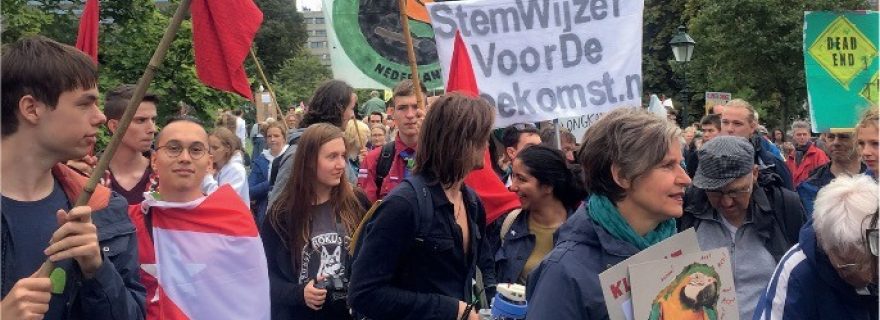Capitalizing on Youth Resilience and Disrupting the Status Quo
“Young people are often not provided with platforms or access to networks that would allow them to negotiate and translate their energy into tangible policy outcomes,” stated a panel participant at the end of a virtual Roundtable hosted by UN Youth Impact. The dialogue was part of the annual Peace and Justice conference organized by the city of The Hague and the Hague Humanity Hub on Tuesday 2 February 2021. During a time that stresses the importance of connectivity, the event explored the dynamics of The Hague’s peace and justice ecosystem, celebrated our resilience, and encouraged us to foster new connections.
The Roundtable, moderated by Ms. Christine Tremblay, a Researcher from the Chair of UN Studies in Peace and Justice research group, aimed to showcase the resilience, enthusiasm, and excitement of young agents of change and to produce recommendations that can be shared with them. With the objective to discuss what an ‘agents of change’ toolkit would be like if it contained a section on how to translate enthusiasm into political action, the Roundtable covered the following topics:
- The impact of Youth and their ability to disrupt the Status-Quo
- Capitalizing on youth resilience and translating their energy into political change
- Recommendations for youth agents on how they can translate ideas into action.
When discussing the involvement of youth in local governance processes, panel participants suggested that young people needa channel through which their voice can be heard. The threshold for the inclusion of youth in organizations and institutions should be lowered, and accurate information should be provided on the feasibility of the initiatives presented by young people within those local governance structures.
Following Ms. Tremblay’s inquiry about the necessary tools for youth to change society, it was mentioned that the current economy is plagued by a crescendo of incompatibilities. The political system, for example, frequently excludes many young people from expressing their voices and political opinions about issues that directly affect them. “If you turn eighteen one week after the general elections, you will have to wait for four years until you can express your vote for the first time”, stated one participant. The Roundtable discussion touched upon the possibility of lowering the election age to ensure the incorporation ofyouth voices in political structures and dialogues surrounding topics that impact the lives of young people.
The precarious nature of the gig economy and labour rights of young people was spotlighted as another important issue. The difficulties for young individuals to succeed on the job and internship markets were underlined. At present, many entry level jobs require years of experience, creating obstacles for young people to join the workforce, since it prevents them from acquiring resources and gaining access to organizations in which they could participate. The participants on the panel agreedthat it might not be necessary to refer to positive discrimination, e.g. administering a quota for hiring young people, to solve this problem. A way to improve the lack of opportunities at the job market for youth would be to build a bridge that combines approaches from inside and outside institutions.
“We need to provide more opportunities for youth, and not having experience should be valued. You can also do a good job when you have zero experience, since you can see things more clearly – that fresh perspective – there is a lot to win there” said Christine Tremblay.
Currently, there is a lack of sustained contribution and a lack of substantive engagement. Institutions are great at hosting dialogues, but there is seldom a permanent youth representative present at the negotiation table. So, what would more concrete ideas to generate substantive change look like? In answer to this question, the panel participants established that youth should be treated like active agents instead of passive actors. They need to be empowered. With the constraints of sustainable finances, youth need to be provided with the skills and adequate training to generate empowerment. In addition, local and regional stakeholders and organizations should present a clearoverview of the different departments and access platforms for youth groups, ensuring the visibility of entrance points for young activists to translate their ideas and energy into tangible action.
Overall, the Roundtable enabled a dynamic discussion on the inclusion of young people in decision making processes at a local, national, and global level. More importantly, the participants investigated how young people can utilize resources at their disposal to generate the aspired impact. It was concluded that, with the sufficient and effective support provided inside and outside of established institutions and political structures, young agents of change can build a solid foundation, gain the trust of the public, and translate their support and enthusiasm into political action and change.
UN Youth Impact would like to thank Ms. Tremblay and the participants of the virtual Roundtable for their time, expertise, and reflective contributions.
UN Youth Impact is a youth-led organization based in The Hague creating a network of students across The Netherlands interested in engaging, at a local level, with the United Nations and its strategies for youth.

